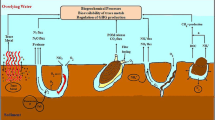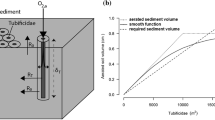Abstract
In aquatic ecosystems, invertebrate bioturbation significantly influences microbial activities and biogeochemical processes in sediments by modifying water and sediment fluxes at the water-sediment interface. We apply the concept of ecosystem engineering to develop a qualitative general understanding of the role of bioturbation on microbial processes in different benthic environments. We hypothesized that the effects of the bioturbation mode (sediment reworking, biogenic structure building, bioirrigation) on microbial processes vary between diffusion- and advection-dominated benthic environments because bioturbation does not have the same influences on hydrological exchanges (and the flux of resources for micro-organisms living in sediments) at the water-sediment interface of the two systems. To test this hypothesis, we experimentally compared the influence of three bioturbation modes (fine-sediment reworking, U-shaped structure burrowing, and gallery-network burrowing) in a diffusion-dominated system (fine sediments/low interstitial flow rates) and an advectiondominated system (coarse sediments/advection of water in sediments). Our analysis demonstrated that bioturbation modes in the two systems had different impacts on microbial activities. For instance, U-shaped tube burrowing by animals increased O2 consumption in the diffusion- dominated system but produced the opposite effect in the advection-dominated system. The influence of bioturbation was also negatively related to interstitial flow rate, the bioturbation having a higher influence on O2 consumption in the diffusion-dominated system than in the advection-dominated system. According to our hypothesis, bioturbation modified microbial processes in sediments depend on the hydrological characteristics of the system. In the diffusion-dominated system, invertebrate bioturbation can produce water fluxes at the watersediment interface that may strongly influence microbial processes in sediments. In contrast, in the advectiondominated system, invertebrate bioturbation can only modify the water circulation patterns in sediments, moderately affecting microbial processes. Consequently, it is necessary to use a conceptual framework which takes into account the features of sediment habitats in order to allow a better prediction of bioturbation effects on sediment biogeochemistry. With this aim, the conceptual scheme of ecosystem engineers can be an organizing principle to integrate the complex relationships among physical habitat, bioturbation mode and microbial activity.
Similar content being viewed by others
Author information
Authors and Affiliations
Corresponding author
Additional information
Received: 12 December 2005; revised manuscript accepted: 26 March 2006
Rights and permissions
About this article
Cite this article
Mermillod-Blondin, F., Rosenberg, R. Ecosystem engineering: the impact of bioturbation on biogeochemical processes in marine and freshwater benthic habitats. Aquat. Sci. 68, 434–442 (2006). https://doi.org/10.1007/s00027-006-0858-x
Published:
Issue Date:
DOI: https://doi.org/10.1007/s00027-006-0858-x




